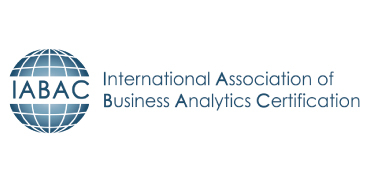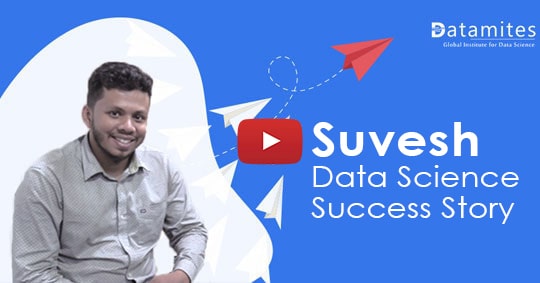Instructor Led Live Online
Self Learning + Live Mentoring
Customize Your Training
The entire training includes real-world projects and highly valuable case studies.
IABAC® certification provides global recognition of the relevant skills, thereby opening opportunities across the world.
To equip the candidate with the knowledge of Computer Vision.
DataMites™ is an authorized institute by the International Association of Business Analytics Certifications (IABAC™) providing global data science certification courses
DataMites™ is founded by Data Science/Analytics Experts, who had deep roots in the industry in the USA and Europe for decades.
You benefit from course syllabus of DataMites™ as designed inline with job requirement in the current market
You can choose from flexible learning options: Traditional classroom, Live Virtual classroom, and Self-learning.
DataMites™ has a dedicated Placement Assistance Team (PAT), which assists you to find the right data science job
If you are a worthy candidate, you can get an opportunity to work in global data science consulting projects
You can treat your DataMites™ relationship manager as your pal. We value your every request.
Deep Learning is a branch of machine learning that utilizes artificial neural networks to imitate the learning capabilities of the human brain. It involves training neural networks with multiple layers to extract complex patterns and achieve precise predictions or classifications.
Deep Learning operates by constructing and training neural networks with multiple layers of interconnected nodes called neurons. Each layer processes and transforms data, passing it to the next layer for further computation. Through backpropagation, the network adjusts connection weights to minimize errors and enhance predictions.
Deep Learning finds applications in diverse industries, including image and speech recognition, natural language processing, autonomous vehicles, healthcare diagnostics, recommendation systems, and fraud detection.
Noteworthy Deep Learning frameworks include TensorFlow, PyTorch, Keras, Caffe, and Theano. These frameworks provide efficient tools and libraries for building, training, and deploying deep neural networks.
Deep Learning is a subset of Machine Learning that concentrates on training deep neural networks with multiple layers. Unlike traditional Machine Learning, Deep Learning models automatically learn hierarchical representations from raw data, reducing the need for manual feature engineering.
To embark on a Deep Learning journey:
Deep Learning offers a broad range of career opportunities, including roles like Deep Learning Engineer, Data Scientist, Research Scientist, Machine Learning Engineer, Computer Vision Engineer, and Natural Language Processing Engineer. These roles span across sectors such as healthcare, finance, e-commerce, and autonomous vehicles.
In order to thrive in a Deep Learning career, it is crucial to have a solid grasp of mathematics, specifically in areas like linear algebra and calculus. Proficiency in programming languages like Python and hands-on experience with popular Deep Learning frameworks such as TensorFlow or PyTorch are indispensable. Furthermore, possessing skills in data preprocessing, model optimization, and effective problem-solving are highly advantageous in this field.
Salary prospects for Deep Learning professionals vary based on factors such as experience, location, and industry. On average, Deep Learning engineers and Data Scientists earn competitive salaries. According to industry reports, the median salary for a Deep Learning Engineer in the United States is $164,095 per year, with senior-level professionals earning even higher. (Indeed)
Networking and professional connections play a crucial role in Deep Learning careers. Building connections with peers, researchers, and industry experts can lead to collaborations, mentorship opportunities, and access to job openings. Networking platforms, industry events, and online communities dedicated to Deep Learning provide avenues for meaningful connections.
Continuous learning is vital in Deep Learning careers due to the rapid advancements and evolving nature of the field. Staying updated with the latest research papers, attending conferences and workshops, and exploring new techniques and tools are essential to remain relevant and competitive. Continuous learning equips professionals to tackle new challenges and embrace emerging opportunities.
The future of Deep Learning looks promising as it continues to advance and find applications across various industries. Ongoing research and development are expected to enhance the efficiency, interpretability, and ability of Deep Learning models to handle complex tasks. With the exponential growth of data, Deep Learning's capability to extract valuable insights from large datasets will become increasingly valuable, driving further innovation and adoption.
Computer vision is an area of artificial intelligence dedicated to empowering computers with the ability to comprehend and interpret visual data obtained from images or videos. It encompasses the extraction of valuable information, identification of objects, and the execution of tasks such as object detection, image segmentation, and image classification.
A computer vision expert is a professional with specialized knowledge and expertise in the field of computer vision. They possess deep understanding and practical experience in developing algorithms, models, and systems to analyze and interpret visual data using techniques such as image processing, pattern recognition, and deep learning.
Computer vision and deep learning are closely related. Deep learning, specifically deep neural networks, has revolutionized computer vision by enabling the automatic learning of hierarchical representations from raw image data. Deep learning models have achieved remarkable results in various computer vision tasks, surpassing traditional computer vision techniques in accuracy and performance.
Learning computer vision opens up numerous opportunities in fields like robotics, autonomous vehicles, healthcare, surveillance, and augmented reality. It allows you to develop applications that can understand and interpret visual data, enabling automation, object recognition, and intelligent decision-making based on images or videos. Computer vision skills are in high demand and offer exciting career prospects.
No. Coding is not required to learn Computer Vision Expert courses.
This course is perfectly aligned to the current industry requirements and gives exposure to all the latest techniques and tools. The course curriculum is designed by specialists in this field and monitored and improved by industry practitioners on a continual basis.
You can enrol for the Computer Vision Expert Course by visiting our website, and doing the payment through Debit/Credit card, Visa. The receipt for the payment done will be sent to your registered E-mail id.
Yes. You will be given a certificate after the completion of the Computer Vision Expert course.
You will receive certification from IABAC® - International Association of Business Analytics Certification.
No, the exam fees are already included in the course fee and you will not be charged extra.
Course fee needs to be paid in one payment as it is required to block your seat for the entire course as well as book the certification exams with IABAC™. In case, if you have any specific constraints, your relation manager at DataMites™ shall assist you with part payment agreements
DataMites™ has a dedicated Placement Assistance Team(PAT), who work with candidates on an individual basis in assisting for the right Data Science job.
You get a 100% refund training fee if the training is not to your satisfaction but the exam fee will not be refunded as we pay to accreditation bodies. If the refund is due to your availability concerns, you may need to talk to the relationship manager and will be sorted out on case to case basis
DataMites™ provides loads of study materials, cheat sheets, data sets, videos so that you can learn and practice extensively. Along with study materials, you will get materials on job interviews, new letters with the latest information on Data Science as well as job updates.
The DataMites Placement Assistance Team(PAT) facilitates the aspirants in taking all the necessary steps in starting their career in Data Science. Some of the services provided by PAT are: -
The DataMites Placement Assistance Team(PAT) conducts sessions on career mentoring for the aspirants with a view of helping them realize the purpose they have to serve when they step into the corporate world. The students are guided by industry experts about the various possibilities in the Data Science career, this will help the aspirants to draw a clear picture of the career options available. Also, they will be made knowledgeable about the various obstacles they are likely to face as a fresher in the field, and how they can tackle.
No, PAT does not promise a job, but it helps the aspirants to build the required potential needed in landing a career. The aspirants can capitalize on the acquired skills, in the long run, to a successful career in Data Science.
DataMites is widely recognized as one of the best deep learning course providers. They offer a comprehensive curriculum, renowned faculty, and industry-recognized certifications, making them a global institute for deep learning education.
DataMites offers the following Deep Learning Certification Training: Certified Deep Learning Expert, Certified Computer Vision Expert, Deep Learning with Python Courses, and Deep Learning - Tensorflow.
The DataMites Certified Computer Vision Expert Course is designed to equip individuals with expertise in computer vision, a subfield of deep learning. Participants learn to apply deep learning algorithms and techniques to tasks such as image classification, object detection, image segmentation, and facial recognition. The course covers popular computer vision frameworks and tools, enabling students to develop real-world computer vision applications.
The DataMites Certified Computer Vision Expert Training is open to individuals who are interested in gaining expertise in computer vision, a subfield of deep learning. This training is suitable for students, working professionals, researchers, and anyone looking to enhance their skills and knowledge in computer vision using deep learning techniques.
The DataMites Certified Computer Vision Expert Course is designed to provide expertise in computer vision, a subfield of deep learning. Participants learn to apply deep learning algorithms to tasks such as image classification, object detection, and facial recognition.
There are compelling reasons to choose DataMites for Certified Computer Vision Expert Training Online, including global accreditation, a large student community, a comprehensive learning approach with self-study materials and live sessions, globally recognized certification, and internship opportunities.
The Certified Computer Vision Expert Course at DataMites varies based on the chosen course and training mode.
The Flexi-Pass option allows you to attend DataMites training sessions for a duration of 3 months, providing added support and guidance to enhance your learning experience.
Yes, upon completing the Certified Computer Vision Expert Courses at DataMites, you will be awarded the prestigious IABAC® certification, which holds global recognition and adds value to your professional profile.
The DataMites Placement Assistance Team(PAT) facilitates the aspirants in taking all the necessary steps in starting their career in Data Science. Some of the services provided by PAT are: -
The DataMites Placement Assistance Team(PAT) conducts sessions on career mentoring for the aspirants with a view of helping them realize the purpose they have to serve when they step into the corporate world. The students are guided by industry experts about the various possibilities in the Data Science career, this will help the aspirants to draw a clear picture of the career options available. Also, they will be made knowledgeable about the various obstacles they are likely to face as a fresher in the field, and how they can tackle.
No, PAT does not promise a job, but it helps the aspirants to build the required potential needed in landing a career. The aspirants can capitalize on the acquired skills, in the long run, to a successful career in Data Science.













